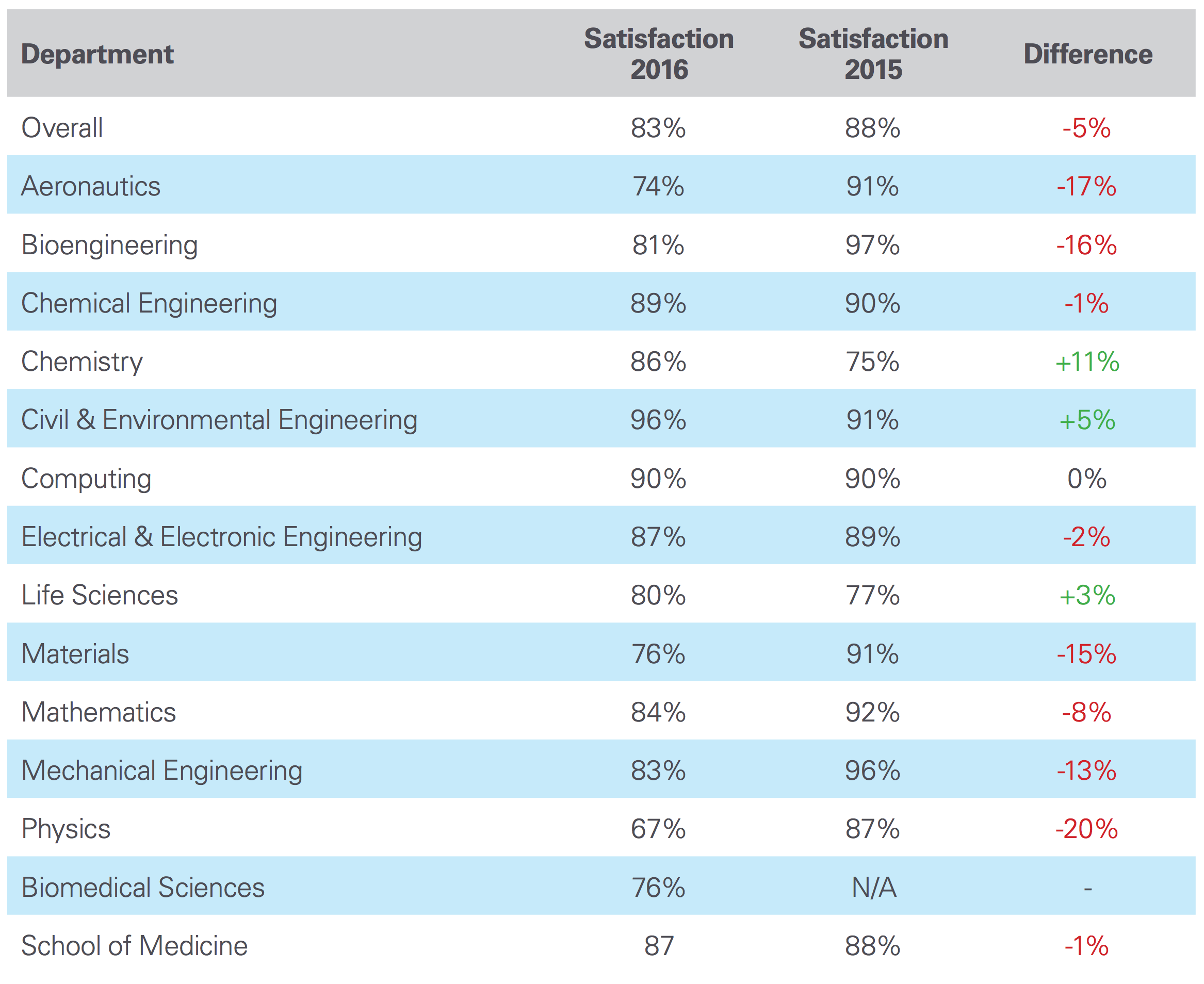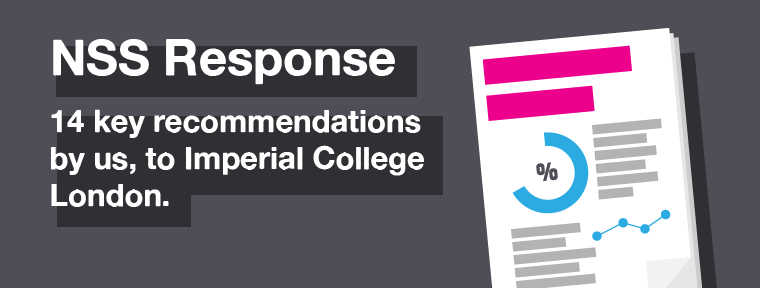The results from the National Student Survey this year revealed that the number of students satisfied with Imperial College London dropped by 5%, with the number of students satisfied with us, the Union, dropping by 7% (from 2015 to 2016). These new results still put the Union with a higher satisfaction rating than most Student Unions. However, we should always aim to be the best, and understand why and how Imperial College London and the Union can improve our student satisfaction.
We’ve spent dozens of hours carefully crafting 14 recommendations for the College to take action on, and for the first time ever the College have agreed to implement all of them – an unprecedented move. This is a huge step in the right direction, and shows real commitment from the College. Our fundamental aim at the Union is to make your time at Imperial the best it can be. It’s been that way for over 100 years, since the day we were founded.

What is the National Student Survey?
The NSS is completed by final-year Undergraduate students shortly before they graduate. It asks students to reflect on their time at university and give feedback on the quality of their educational experience here at Imperial. The results from the survey are published a few months later and offers us a wealth of insight into the student experience, drawing our attention to key areas of excellence and weakness. Our annual response gives us the opportunity to amplify the student voice and drive forward significant and lasting change.

Why does it matter?
The National Student Survey holds universities accountable. They use it to identify strengths and weaknesses, monitor change, and help improve the overall experience for their students. The results are all publicised every year, allowing prospective students to make informed decisions about where and what to study.
Our 14 recommendations
What the College should do better
Teaching

1. Departmental staff should work with students in the teaching review process, ensuring student representation on quality assurance panels.
2. Recognise and invest in exemplary teaching, providing exceptional lecturers with the opportunity to continually evolve teaching methods and experiment with innovative teaching styles and tools.
3. Students should be given the opportunity to act as teaching consultants.
Assessment and Feedback

4. Feedback Traffic Light system should be implemented to regulate feedback timeliness.
5. Departmental leader(s) should be responsible for overseeing the quality of feedback across the department, interacting closely with Academic Reps and students.
6. Students and academics should work closely to co-design curricula assessment and feedback practices.
Academic Support

7. Continue to develop the Personal Tutor system, considering the establishment of a Personal Tutor network. Consider splitting the academic and pastoral care aspects of the role.
8. Standardise the administration around mitigating circumstances to a faculty level.
Organisation and Management

9. Collate deadlines for all modules in a single departmental repository to assist in achieving an even distribution of deadlines which avoids clashes in all student timetables.
10. Adhere to existing College policy by providing termly timetables in advance of term start dates.
Learning Resources

11. Reflect on how better to use College room space at times of high intensity, working closely with the Central Timetabling Support Office and the new Associate Provost (Space).
12. The college should continue to ensure that the facilities used for teaching continue to be world-class, supporting lecturers and students to be continually innovative in utilising digital technology for learning.
Personal Development

13. Ensure that all departments agree a minimum amount of free time provided for students, decided at the Faculty level by closely working with students.
14. Embed relevant key graduate attributes within learning outcomes of each module.
Our two additional recommendations
What we, the Union, should do better

15. Review the methods that Imperial College Union uses to communicate information to its student members in the interest of achieving transparency with its processes, organisational structures and actions.
16. Explore new ways of engaging students and strive to empower volunteers to take an active role in making change.
The scores for each department
This year, there has been some brand new scores for each department, and there have been some big changes. We've detailed all of the changes below, and you'll be able to find them in our full report. These percentages are the proportion of students who replied that they were satisfied with the performance of their department.

Read our full Response

Our full Response, which offers further insight into our 16 overall recommendations, and offers samples of actual student feedback, can be read below.
The Union have immensely enjoyed compiling this Response, and look forward to working with College to transform these recommendations into action.
Download a PDF of the NSS Response 2016 and our Vital Statistics document





